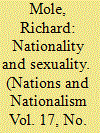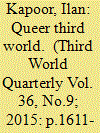|
|
|
Sort Order |
|
|
|
Items / Page
|
|
|
|
|
|
|
| Srl | Item |
| 1 |
ID:
106037


|
|
|
|
|
| Publication |
2011.
|
| Summary/Abstract |
This article seeks to understand why attitudes towards homosexuality in Latvia appear to be more intolerant than in all other EU member states. It argues that, while the impact of religion, the legacy of communism and post-communist transition have all played a role in shaping attitudes towards homosexuality in Central and Eastern Europe, these factors do not explain sufficiently the divergence among post-communist states and, in particular, do not account for Latvia's extreme position. While acknowledging that intolerance towards non-heteronormative sexuality cannot be explained by a single factor but is the cumulative effect of a range of social influences, this study argues that homosexuality is particularly reviled in Latvia because it has been constructed discursively as a threat to the continued existence of the nation in its desired ethnic form and to the core values defining Latvian national identity.
|
|
|
|
|
|
|
|
|
|
|
|
|
|
|
|
| 2 |
ID:
178251


|
|
|
|
|
| Summary/Abstract |
With a focus on contemporary South Africa, and through the lens of queer identity and politics, the article critiques the limitations and possibilities for queerness and its futures in post-apartheid South Africa. From the advent of constitutional democracy and its ushering in of human rights, the article analyses developments in the politics of sexuality in the context of enduring systems of violence, rooted in colonial and apartheid histories. Discrimination against lesbian, gay, bisexual, transgender and intersex people – at the intersection with other forms of discrimination – has emerged as a focal point for political resistances in the post-apartheid period. These resistances are interrogated, including the paradoxes of rights struggles that they expose, and the contradictions between formal equality gains and present queer realities that they call attention to. With an emphasis on enduring inequalities within post-apartheid society, and on the racialisation of violence against queerness, the article explores various political formations of and for queer freedom. In navigating these dynamics of inequality and difference, the article urges a radical politics – both for relating as equals, and against the violent ends of othering.
|
|
|
|
|
|
|
|
|
|
|
|
|
|
|
|
| 3 |
ID:
141135


|
|
|
|
|
| Summary/Abstract |
This article attempts to align ‘queer’ and ‘Third World’ – grouping them in their common inheritance of subjugation and disparagement and their shared allegiance to non-alignment and a politics aimed at disrupting domination and the status quo. In assembling both terms one is struck by how, in the mainstream discourse of international development, the Third World comes off looking remarkably queer: under Western eyes it has often been constructed as perverse, abnormal and passive. Its sociocultural values and institutions are seen as deviantly strange – backward, effete, even effeminate. Its economic development is depicted as abnormal, always needing to emulate the West, yet never living up to the mark (‘emerging’ perhaps, but never quite arriving). For their part, postcolonial Third World nation-states have tended to disown and purge such queering – by denying their queerness; indeed often characterising it as a ‘Western import’ – yet at the same time imitating the West and pursuing neoliberal capitalist growth. I want not only to make the claim that the Western and Third World stances are two sides of the same discourse but, drawing on Lacanian queer theory, also to suggest that a ‘queer Third World’ would better transgress this discourse by embracing queerness as the site of structural negativity and destabilising politics.
|
|
|
|
|
|
|
|
|
|
|
|
|
|
|
|
|
|
|
|
|